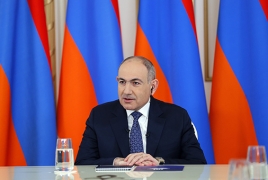
Prime Minister Nikol Pashinyan, speaking with journalists, did not rule out the possibility that at some stage, Armenia would provide a route for Azerbaijan.
"Yes, we will provide a road for Azerbaijan. How exactly we will do so is detailed in my article," Prime Minister Pashinyan stated, reports Radar.am .
He added that once Azerbaijan provides an official response, Armenia will be ready to implement the proposal immediately.
Addressing the issue of a route from Azerbaijan to Nakhichevan through Armenian territory—often referred to as a "corridor"—Pashinyan also commented during an interview with Turkish media, emphasizing that for Armenia, the term "Zangezur corridor" is both unclear and unacceptable.
"The Republic of Armenia has no connection to this expression. The mere fact that this term is used is perceived as a territorial claim against Armenia’s sovereignty and territorial integrity," he stated.
Pashinyan mentioned that he had published an article on the matter, stressing that Armenia supports the unblocking of regional communications.
"Let me emphasize that we are the primary advocates for opening regional transport routes because, in reality, we are the ones under blockade. No other country in the region is blockaded—we have four borders, two of which are completely closed," he said.
The Prime Minister pointed out that while references are often made to Article 9 of the November 9, 2020, trilateral statement, the term "corridor" is entirely absent from that section.
"I understand that the word 'corridor' may be used differently in other regions and international discourse, but in the context of the November 9 trilateral statement, there is a key nuance: it explicitly mentions the 'Lachin corridor,' meaning it was written and signed. However, in Article 9 of the trilateral statement, the term 'corridor' is nowhere to be found," he stressed.
Pashinyan added that the November 9 agreement contains no provisions allowing third-party forces to ensure the safety of cargo and passenger transportation through Armenian territory.
"On the contrary, it states that the Republic of Armenia guarantees the free movement of goods, vehicles, and passengers," he noted.
The Prime Minister also emphasized that the trilateral statement cannot be interpreted selectively.
"For example, the statement mentions the exchange and return of prisoners, hostages, and detainees. Yet, this issue remains unresolved and has worsened due to the ongoing trials in Baku, which, in our view, are staged proceedings involving prohibited methods, torture, and, based on our information, other unlawful practices," Pashinyan stated.
He reiterated that Armenia is ready to facilitate Azerbaijan’s connection between its western regions and Nakhichevan through Armenian territory.
"We have made a very specific proposal to Azerbaijan, which we believe is not just an offer but a real solution for railway freight transport. We are awaiting Azerbaijan’s response.
I would like to draw attention to the fact that the specific agenda of ensuring transport connectivity between Azerbaijan’s western regions and Nakhichevan was not an independent issue in the November 9 trilateral statement or in the 2020 negotiations. Instead, it falls under the broader agenda of unblocking regional transport routes. This means Armenia and Azerbaijan must mutually open their communications—Armenia via Azerbaijani territory and Azerbaijan via Armenian territory," he explained.
Pashinyan noted that there is currently no railway link between Armenia’s northern regions and Meghri, meaning that transit is only possible through Azerbaijan’s Nakhichevan region.
"Therefore, we are saying that we are, of course, ready to ensure railway connectivity and expect the same level of access in return," he concluded.

